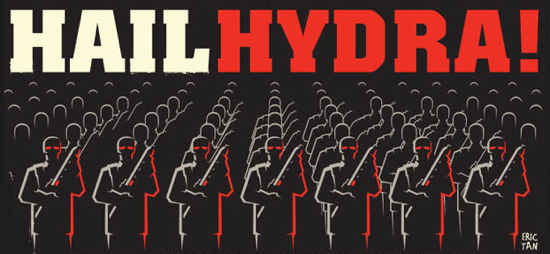Martha Thomases: Fear And Loathing at Hydra
Over the last few weeks we’ve seen a vigorous discussion among people who create and/or love comics about the relationships and responsibilities of creators and fans. This is nothing new — fans have been demanding certain kinds of stories that authors don’t want to create at least since Conan Doyle was forced to bring Sherlock Holmes back from the dead — but the internet brings so many more people into the conversation.
And too many of these people on the internet don’t understand the difference between a discussion among people with different points of view and a unilateral demand for submission.
The specific irritant this time is the big reveal that Steve Rogers, our beloved Captain America, is and always has been an agent of Hydra.
Now, I don’t read Cap. Nothing against him, just not my jam. Still, when I read a commentary from the Israeli newspaper, Ha’aretz declaring that Cap’s creators, Joe Simon and Jack Kirby, wouldn’t have approved because of implied anti-Semitism, I found it interesting.
Interesting. Not canon. Not a papal edict. Interesting.
Apparently that story, while critical of Marvel’s editorial decisions, was an outlier. Many more fans took up keyboards to proclaim their displeasure and demand that things go back the way they used to be. Here and here you can read intelligent analyses of what happened.
I think it’s important here to draw a distinction between someone who says “I don’t like this,” and someone who says, “I don’t like this and you suck and I’m going to find out where you live and kill you.” There is also a difference between someone who says, “I don’t like the start of this story, and I’m not going to read it” and someone who says, “I don’t like the start of this story, but I’m going to read a few more issues and see if it gets better.”
Some stories, written by people I like, drawn by people I like, just don’t do it for me. Some stories, written and drawn by people I haven’t liked in the past, break through my previous assumptions and I enjoy them. Sometimes, because of specific things that have happened to me, a story will provoke an association in my mind that is different from what the authors intended.
That’s okay.
I can make connections that are interesting to me even if these ideas are different from what anyone else sees. Years ago, when I read Kingdom Come, I remember telling Mark Waid that the story seemed to be an allegory for the Democratic Party at the time, with the ideals of New Deal Democrats coming face-to-face with the new reality of Clinton’s New Democrats, which diluted and militarized FDR’s dreams.
Mark, of course, looked at me as if I was crazy. Maybe. Still, it was an entertaining conversation to have. At least for me.
Do I think Nick Spencer, the writer, and Marvel, the corporate entity, are deliberately trying to offend fans and insult Joe Simon and Jack Kirby? No, of course not. I think they are trying to tell stories that will entertain enough people to make a profit. At the same time, I think fans who buy comics and don’t like the story have every right to say what they don’t like.
Politely, and within the accepted parameters of comic book criticism (which I would define rather broadly). In other words, you can say the story sucks. You can say the writing/art/editing suck. You can say that corporate ownership of intellectual property inevitably decreases the value of that property. You can make an analogy to what has happened to Captain America since the Kirby/Simon days and what’s happened to Harlem since gentrification.
But you can’t make physical threats against people.
At the other end of this conversation, we have people who object when someone who created a beloved body of work continues that body of work. I’m talking about J. K. Rowling and her new Harry Potter stories. Apparently, there are fans who are upset that Rowling authorized and contributed ideas for a play about grown-up Harry and Ginny, their children and friends. To these fans, anything beyond the original books is heresy, and Rowling should do something else.
If Rowling somehow went back and erased all previous editions of her books and the movies based on them, maybe these fans would have a point. That isn’t happening. Those stories are still there. Fans can continue to read and re-read stories about Harry as a student at Hogwarts.
Just as they can continue to read and re-read the Simon/Kirby Cap, and any other issues they liked. In a few years, there will be a new creative team on the series, and I would bet money that this Hydra story will disappear.
At least, I hope so. I’m really hoping that this run of Wonder Woman will be forgotten as soon as possible.












